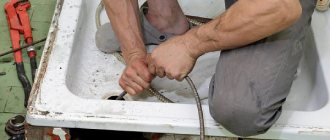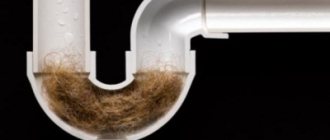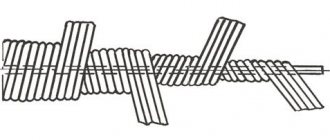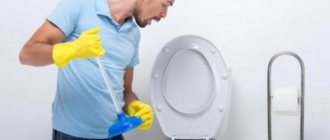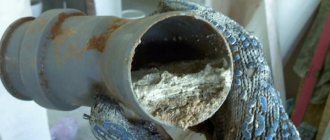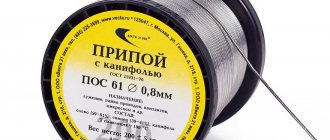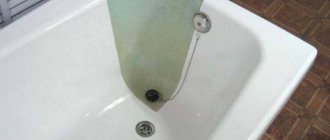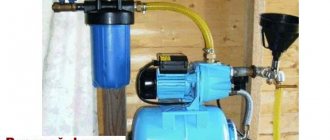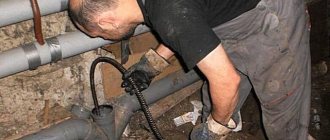To clean the sewer pipe, we use the common fast-acting preparation “Premium Pothan” - this is a solution of caustic alkali. Pour the product into the clogged pipe (approximately 70 g), then pour a glass of hot water and leave for 3-5 minutes. Then we flush the drain with a strong stream of hot water.
You can also use baking soda and vinegar. Pour half a pack of soda into the drain and add vinegar. Plug the drain with a plug. Wait 2 hours and rinse with boiling water (4-5 liters). If this does not help, use strong alkali-based preparations.
A blockage in pipes and its removal at home is an everyday matter, but in the process of cleaning the system, certain difficulties may arise. In this article we will look at many ways to solve this problem and how to avoid such a situation in the future.
In a modern private home it is impossible to imagine life without high-quality sewerage. It is best, of course, to install sewerage during the construction stage.
It is not difficult to install it, even on your own, without calling specialists. But there are points that you should pay attention to first. For example, an incorrect slope of a sewer pipe will often cause your pipeline to become clogged.
Causes and signs of clogged sewer pipes
One of the big troubles that you can often encounter is when the sewer system becomes clogged. Of course, this problem is not critical and to solve it there is no need to call a specialist - a plumber. Anyone can clean pipes at home without any special knowledge or tools.
You can understand that your system has become unusable due to the fact that it is clogged by the following factors.
- There is a bad smell coming from the bathtub, sink or toilet.
- The water began to drain much more slowly.
- The liquid level under the drain grate is too high.
To prevent sewer blockages, special screens and filters are widely used. But they cannot guarantee the occurrence of blockages.
Fats and oils that end up in drains with water and other waste often contribute to this problem. They accumulate on the walls, which leads to a decrease in the throughput of the system.
As a result of the formation of such plaque, drainage becomes difficult and may eventually stop completely. Blockages in a private home can also occur as a result of foreign objects entering the pipeline.
But still a common cause is organic waste. Cleaning in a private home can be done in the following ways:
- dry cleaning - carried out using products that have a caustic base;
- mechanical - using special tools;
- hydrodynamic cleaning under high pressure.
Regardless of the design and materials used, cleaning at home begins with disassembling the siphon.
There are several siphons in the house. Every sink and bathtub has this device. With its help, you can prevent unpleasant odors from coming from the sewer.
It is better to clean the siphon at home using various products. If the siphon is clogged, you can use boiling water and soda. This mixture allows you to eliminate the fat layer.
To make it, you need to add four tablespoons of baking soda to three liters of boiling water. You can increase the effectiveness of the solution by adding vinegar.
If you understand why this occurs, you can eliminate it quickly and without unnecessary complications. Knowing all the causes of blockages, you can prevent troubles. To do this, it is necessary to identify weak points in the sewer structure and carry out preventive measures in these areas of the drainage system. It is best not to delay and clean everything on time.
If this does happen, then the methods of elimination vary, depending on the sewer system. Also, to understand how best to clean pipes, you need to know what material they are made of.
Prevention
To avoid having to suffer with sewerage, follow simple preventive measures:
- install a special mesh on the drain in the kitchen sink to trap food waste;
- do not flush hair down the sink or toilet;
- do not throw paper, hygiene products and other insoluble waste into the toilet;
- Perform preventative cleaning of the system approximately once a month.
It should be noted that modern plastic pipes are less susceptible to contamination than metal ones. To maintain the permeability of the system, in most cases it is enough to clean the siphons in a timely manner.
Differences in clogs
In buildings of the Soviet and post-Soviet period, cast iron pipes were mainly used. They have both pros and cons. The main disadvantage is that during operation they are subject to corrosion. Often, inside cast iron pipelines, the walls become uneven due to build-ups that form from rust and plaque.
Since a cast iron pipe can become too narrow in any part of the structure due to corrosion, it is very difficult to determine the location of the problem. Due to this, cleaning will be difficult.
Most often, cast iron products clog in the area coming out of the sink inside the kitchen, or the area coming out of the toilet. In a cottage, the sewer can become clogged in almost any area, but cleaning it in a hard-to-reach place is not so easy.
In plastic sewer systems this can occur due to incorrect installation. For example, the required angle of inclination was not taken into account. In this case, plaque forms inside, which needs to be cleaned to avoid further clogging.
If all else fails
If the cause of the problem is a clogged siphon, then none of the methods described may be able to solve it. In this case, it must be dismantled and cleaned. You don’t have to call a plumber to do this; you can do it yourself.
Method 8. Disassembling the siphon and cleaning it
- Place a deep basin or bucket under the sink.
- Unscrew the nut holding the siphon.
- Remove the siphon, clean it from dirt, and rinse with running water.
- Put it in its place.
- Rinse the pipes with tap water.
Fatty plaque - removal at home
The most important reason for clogging of the sewer system was fatty deposits. It appears inside while washing dishes. Due to its high viscosity, fat retains small particles of debris, such as hairs, pieces of food, grains of sand and the like.
Subsequently, the sediment forms a thick layer, which reduces throughput. In a private home, fatty deposits are the worst enemy.
In order to prevent frequent blockages due to grease deposits, it is necessary to install grease traps. These devices will prevent clogging, and you will save significantly on the purchase of household chemicals.
These devices consist of special sections that retain fat and debris inside them. If a grease trap is installed, then you will not have a question about how to clean the drainage system in a private house.
But if grease deposits have nevertheless overtaken your sewer system, then with a quick response you can quickly eliminate everything. To do this, dry the sink completely with a dry cloth.
Then immediately pour boiling water inside the kitchen sink drain. If she starts to leave, then you need to continue the process. Once the blockage is cleared, flush the drain pipe with hot water.
You can clean a sewer pipe at home using regular soda and vinegar. In order to carry out this procedure, you need to follow it step by step.
- The kitchen sink is wiped dry.
- Pour one spoon of soda into the drain.
- Prepare a sink drain plug or an old rag.
- Pour half a cup of vinegar into the drain.
- Immediately close the sink opening.
Video - removing blockages at home using baking soda
